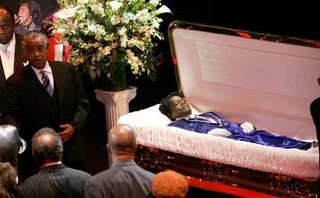The people - 98 per cent black - came to say goodbye to the Godfather of Soul, as he was billed at the front of the theatre, at the place most closely associated with him.
 Showman ... Al Sharpton greets mourners as they file past James Brown's open casket in the Apollo Theatre.
Showman ... Al Sharpton greets mourners as they file past James Brown's open casket in the Apollo Theatre.WHEN James Brown played the Apollo Theatre, he used to ask: How many people are there? Is the line around the block?
In death, he packed the Apollo for one last time. It was his biggest-ever audience at the famous theater in Harlem that launched the careers of many great artists.
The people lined up all day in two queues that went around the block. For eight hours people filed past his open coffin.
Some wore the T-shirts that hawkers sold. Others wore badges or tickets from old concerts. Boom boxes, resurrected from the garage or storage, blared out It's a Man's Man's Man's World, or I Got You (I Feel Good).
A showman to the last, his body was dressed in a sequinned midnight-blue suit, complete with white gloves and silver shoes. It arrived in a horse-drawn white hearse, pulled by two white horses dressed as if for a trooping of the colour.
The gold casket was so heavy, the Reverend Al Sharpton said, it could not be flown to New York.
The people - 98 per cent black - came to say goodbye to the Godfather of Soul, as he was billed at the front of the theatre, at the place most closely associated with him.
John Fitzgerald was one of the few white faces in the crowd. He saw Brown perform on his 70th birthday at a free concert in New York in 2003.
"It was not the greatest concert I've ever seen; it was the greatest thing I've ever seen. You've never seen James Brown perform live? You have no idea. It was a combination of God and the devil - together."
Mr Sharpton, the New York black activist for whom Brown was a mentor and a surrogate father, told family and friends assembled in the theatre that the tens of thousands of mourners had come not just because of his music. "We didn't line the streets because he had hits - many people had hits. We didn't line these streets because he had awards, many people had awards. James Brown didn't need a hit to be a superstar. James Brown changed the culture."
He said that one song Say It Loud - I'm Black and I'm Proud had erased the word "negro" from the vocabulary of African Americans forever.
For a man with a messy private life - he was in and out of jail, and had four wives, including one with whom the legality of the marriage is disputed - he was still a role model.<smh>






Megan_Fox_6+copy.jpg)









0 comments:
Post a Comment